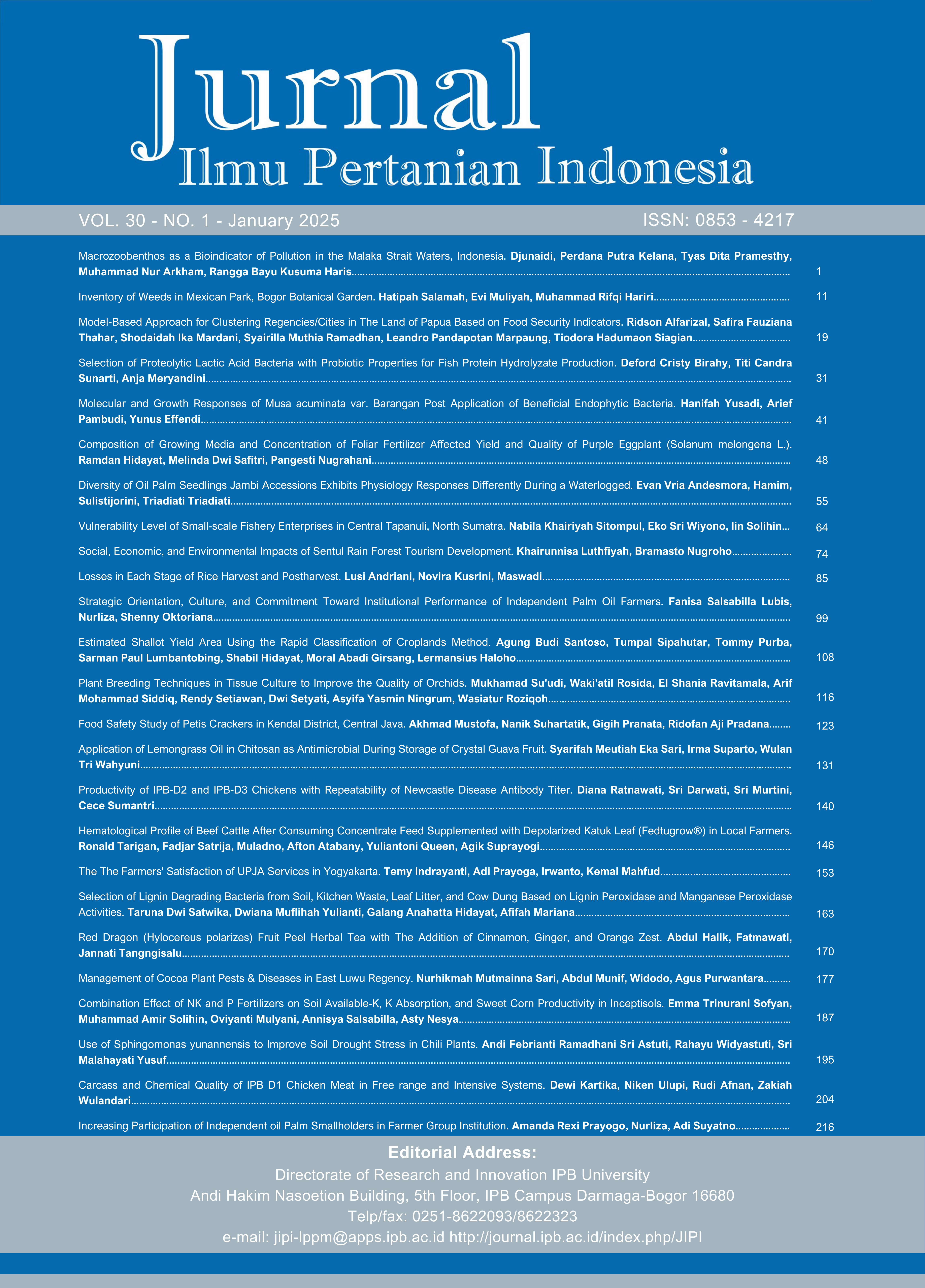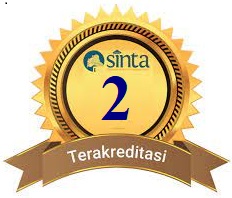Strategic Orientation, Culture, and Commitment Toward Institutional Performance of Independent Palm Oil Farmers
Abstract
Independent oil palm farmers are crucial to the growth of the national economy. However, due to subpar institutional and farmer group performance, independent oil palm farmers' productivity still needs to improve. This research aimed to maximize institutional performance within the frameworks of social exchange theory and resource-based view theory. The study employed structural equation modeling, or SMART-PLS, and quantitative descriptive methodologies to examine 92 farmer group administrators in Sambas Regency, West Kalimantan. The study's findings illustrate that strategic orientation, culture, and commitment affect institutional/farmer group performance. In maximizing institutional performance, the following was done: 1) planning for environmental conservation by setting clear deadlines and assigning members to consider environmental sustainability and refrain from burning land; 2) communicating with the community and members to foster community harmony; 3) holding online group discussions for members who are unable to attend in order to save time discussing issues collectively; b. imposing strict sanctions for infractions by its members; 4) fostering active dialogues among members and working directly or virtually with instructors regarding oil palm cultivation knowledge. The most recent study aims to develop strategies for enhancing institutional and farmer group performance through strategic orientation, culture, and commitment.
Keywords: farmer group, performance, independent oil palm farmers, SMART-PLS
Downloads
References
Ahmed A, Khuwaja FM, Brohi NA, Othman I. bin L. 2018. Organizational factors and organizational performance: A resource-based view and social exchange theory viewpoint. International Journal of Academic Research in Business and Social Sciences. 8(3): 594–614. https://doi.org/10.6007/ijarbss/v8-i3/3951
Allen NJ, Meyer JP. 1996. Affective, continuance, and normative commitment to the organization: An examination of construct validity. Journal of Vocational Behavior. 49(3): 252–276. https://doi.org/https://doi.org/10.1006/jvbe.1996.0043
Ames H, Glenton C, Lewin S. 2019. Purposive sampling in a qualitative evidence synthesis: A worked example from a synthesis on parental perceptions of vaccination communication. BMC Medical Research Methodology. 19(1): 26. https://doi.org/10.1186/s12874-019-0665-4
Apriyanto M, Partini, Mardesci H, Syahrantau G, Yulianti. 2021. The Role of Farmers Readiness in the Sustainable Palm Oil Industry Journal Pf Physics : Conference Series. 1764(1): 1–7. https://doi.org/10.1088/1742-6596/1764/1/012211
Arsal T, Setyowati DL, Hardati P, Suroso, Atmaja HT. 2021. Social harmony model for socialconflict management in Central Java. IOP. 1–11. https://doi.org/10.1088/1755-1315/747/1/012087
Aryani NL. 2018. Implementation of Communication Ethics in Building Social Harmony. International Journal of Social Sciences and Humanities. 2(1): 147–156. https://doi.org/http://dx.doi.org/10.29332/ijssh.v2n1.105
Bakhtary H, Haupt F, Luttrell C, Landholm D, Jelsma I. 2021. Promoting sustainable oil palm production by independent smallholders in Indonesia: Perspectives from non-state actors (February). https://doi.org/10.13140/RG.2.2.35216.74242
Betanzos N, Paz F. 2011. Benefits of normative commitment for organizations. Direccionestrtategica. 1: 1–4.
BPDP. 2018. Industri Kelapa Sawit Indonesia Serap 16,2 Juta Pekerja.
BPS. 2020. Statistik Kelapa Sawit Indonesia 2020. Jakarta (ID).
BPS Kalbar. 2021. Luas Tanaman Perkebunan Rakyat 2018–2021. Jakarta (ID).
BPS Sambas. 2021. Kabupaten Sambas dalam Angka 2021. Jakarta (ID): Badan Pusat Statistika. 283 pg.
Cropanzano R, Molina A. 2015. Organizational Justice. International Encyclopedia of the Social & Behavioral Sciences. 17(02): 379–384. https://doi.org/10.1016/B978-0-08-097086-8.22033-3
Disbunnak. 2022. Data Kelompok Tani Sawit Swadaya dan Petani Sawit Swadaya Kab. Sambas. Jakarta (ID).
Ditjenbun. 2020. Statistik Perkebunan Indonesia 20182020. Jakarta (ID).
Dogaru L. 2013. The importance of environmental protection and sustainable development. Procedia - Social and Behavioral Sciences. 93: 1344–1348. https://doi.org/10.1016/j.sbspro.2013.10.041
Emerson ER. 1976. Social Exchange Theory. Annual Review of Sociology. 2: 335–362.
Eskarya H, Elihami. 2019. The Institutional role of farmer groups to develop. Jurnal Edukasi Non Formal. 1(1): 81–87.
GAPKI. 2022. Kinerja Industri Sawit 2021 dan Outlook 2022.
Goll I, Rakesh B. 1986. Corporate Ideology, Diversification, and Firm Performance. identitas rujukan?
Gross J, Vostroknutov A. 2021. Why do people follow social norms? Current Opinion in Psychology. 1–17. https://doi.org/10.1016/j.copsyc.2021.08.016
Hair JF, Hult GTM, Ringle CM, Sarstedt M, Danks NP, Ray S. 2021. Partial Least Squares Structural Equation Modeling (PLS-SEM) Using R. New York (US): Springer International Publishing. https://doi.org/https://doi.org/10.1007/978-3-030-80519-7
Han W, Zhou Y, Lu R. 2022. Strategic orientation, business model innovation and corporate performance—Evidence from construction industry. Frontiers in Psychology. 13: 1–15. https://www.frontiersin.org/journals/psychology/articles/10.3389/fpsyg.2022.971654
Haryono S, Wardoyo P. 2017. Structural Equation Modeling untuk Penelitian Manajemen dengan AMOS Lisrel PLS (H. Mintardja (ed.)). Jakarta (ID): Intermedia Personalia Utama.
Hofstede G. 2011. Dimensionalizing cultures: The Hofstede model in context. Online Readings in Psychology and Culture. 2: 1–26.
Jafar R, Sutrisno A, Sulistyo A, Mubarak A, Kurniasih NMN, Sakti A, Khaerunnisa. 2022. The role of institutions in the downstream agribusiness palm oil (Elaeis sp.) subsystem. In IOP Conference Series: Earth and Environmental Science (Issue 1). https://doi.org/10.1088/1755-1315/1083/1/012037
Jakada MB, Jakada A, Bambale AJ, Hussein MA, Kurawa NS, Rabi’u A. 2019. Effect of affective, continuance, and normative commitments on job performance of employees of national identity management commission, northwest zone, Nigeria. Lapai International Journal of Management and Social Sciences. 11(2): 225–242.
Kementan. 2018. Pedoman Penilaian Kelas Kemampuan Kelompok Tani. Jakarta (ID).
Kochoska J, Petrovski D. 2015. The role of cultural institutions in civic education. International Journal of Science and Research (IJSR). 4: 1458–1462. https://www.researchgate.net/publication/287198716_The_role_of_the_cultural_institutions_in_the_civic_education/citation/download
Kumar S, Leonard A, Watkins R, Vovides Y, Kerby B. 2017. The Art of Knowledge Exchange. Penerbit
Kurniati, Voulina. 2020. Pengaruh karaterisrik petani dan kompetensi terhadap kinerja petani padi sawah di Kecamatan Gunung Toar Kabupaten Kuantan Singingi. Jurnal Agribisnis. 22(1): 82–94. https://doi.org/https://doi.org/10.31849/agr.v22i1.4042
Lestari U, Idris M. 2019. Peran kelompok tani dalam kegiatan usahatani kakao di Desa Ketulungan Kecamatan Sukamaju Kabupaten Luwu Utara. Jurnal Agribisnis Indonesia. 7(2): 92–101. https://doi.org/10.29244/jai.2019.7.2.92-101
Nashr F, Putri EIK, Dharmawan AH, Fauzi A. 2021. The sustainability of independent palm oil smallholders in multi-tier supply chains in East Kalimantan Indonesia. International Journal of Sustainable Development and Planning. 16(4): 771–781. https://doi.org/10.18280/ijsdp.160418
Nurhaliza, Rosnita, Dewi N. 2021. Peran penyuluh dalam penerapan ISPO pada petani kelapa sawit swadaya di Kabupaten Kampar. JSEP (Journal of Social and Agricultural Economics). 14(2): 311–318. https://doi.org/10.19184/jsep.v14i3.25705
Ogahara Z, Jespersen K, Theilade I, Nielsen MR. 2022. Review of smallholder palm oil sustainability reveals limited positive impacts and identifies key implementation and knowledge gaps. Land Use Policy. 120: 106258. https://doi.org/https://doi.org/10.1016/j.landusepol.2022.106258
Papilo P, Prasetiyo D, Hartati M, Permata EG, Rinaldi A. 2020. Analisis dan penentuan strategi perbaikan nilai tambah pada rantai pasok kelapa sawit (Studi kasus Provinsi Riau). Jurnal Teknologi Industri Pertanian. 30(1): 13–21. https://doi.org/10.24961/j.tek.ind.pert.2020.30.1.13
Qaim M, Sibhatu KT, Siregar H, Grass I. 2020. Environmental, economic, and social consequences of the oil palm boom. Annual Review of Resource Economics. 12(1): 321–344. https://doi.org/10.1146/annurev-resource-110119-024922
Rachmadian RH, Pitaloka SD, Nabailah S, Dea S, Tanto T, Wulandhari W, Eka Y, Wagistina S. 2021. Kajian karakteristik petani dan potensi pemanfaatan lahan pertanian hortikultura Desa Sumber Brantas Kota Batu. Jurnal Integrasi dan Harmoni Inovatif Ilmu-ILmu Sosial. 1(6): 792–802. https://doi.org/10.17977/um063v1i62021p792-802
Raharja S, Marimin, Machfud, Papilo P, Safriyana, Massijaya MY, Asrol M, Darmawan MA. 2020. Institutional strengthening model of oil palm independent smallholder in Riau and Jambi Provinces, Indonesia. Heliyon. 6(5): E03875. https://doi.org/10.1016/j.heliyon.2020.e03875
Rashidi Y, Kapadia APU, Nippert-eng C, Makoto N. 2020. “It’s easier than causing confrontation”: Sanctioning strategies to maintain social norms and privacy on social media. Proc. ACM Hum-Comput Intereract, 4(May): 1–25. https://doi.org/https://doi.org/10.1145/3392827
Rhebergen T, Fairhurst T, Whitbread A, Giller KE. 2018. Yield gap analysis and entry points for improving productivity on large oil palm plantations and smallholder farms in Ghana. Agricultural Systems. 165(July): 14–25. https://doi.org/10.1016/j.agsy.2018.05.012
Saragih IK, Rachmina D, Krisnamurthi B. 2020. Analisis status keberlanjutan perkebunan kelapa sawit rakyat Provinsi Jambi. Jurnal Agribisnis Indonesia. 8(1): 17–32. https://doi.org/10.29244/jai.2020.8.1.17-32
Shahputra MA, Zen Z. 2018. Positive and negative impacts of oil palm expansion in indonesia and the prospect to achieve sustainable palm oil. https://doi.org/10.1088/1755-1315/122/1/012008
Sharma G. 2017. Pros and cons of different sampling techniques. International Journal of Applied Research. 3(7): 749–752.
Shigetomi Y, Ishimura Y, Yamamoto Y. 2020. Trends in global dependency on the Indonesian palm oil and resultant environmental impacts. Scientific Reports. 10(1): 1–11. https://doi.org/10.1038/s41598-020-77458-4
Singh AA, Salazar CF. 2010. Six considerations for social justice group work. The Journal for Specialists in Group Work. 35(3): 308–319. https://doi.org/10.1080/01933922.2010.492908
Singh H. 2014. Environmental preservation: A path towards sustainability and economic sustenance. Research Scholar. 45–51.
Singkheeprapha P, Jumani ZA, Sukhabot S. 2021. Is Islamic brand attitudes influence Thai Muslims’ buying behavioural intentions: A quantitative analysis using smart-PLS. Journal of Islamic Marketing. vol(no.): no. hlm. https://doi.org/10.1108/JIMA-08-2020-0252
Sokoastri V, Setiadi D, Hakim A, Mawardhi A, Fadli M. 2019. Perkebunan petani kelapa sawit rakyat: permasalahan dan solusi. Jurnal Sosiologi Pedesaan. 7(3): 182–194.
Wernerfelt B. 1984. A resource-based view of the firm. Strategic Management Journal. 5(2): 171–180. https://doi.org/https://doi.org/10.1002/smj.4250050207
Zhang S, Zhou J. 2018. Social justice and public cooperation intention: mediating role of political trust and moderating effect of outcome dependence. Frontiers in Psychology. 9(August): 1–16. https://doi.org/10.3389/fpsyg.2018.01381

This work is licensed under a Creative Commons Attribution-NonCommercial 4.0 International License.
This journal is published under the terms of the Creative Commons Attribution-NonCommercial 4.0 International License. Authors who publish with this journal agree to the following terms: Authors retain copyright and grant the journal right of first publication with the work simultaneously licensed under a Creative Commons Attribution-NonCommercial 4.0 International License. Attribution — You must give appropriate credit, provide a link to the license, and indicate if changes were made. You may do so in any reasonable manner, but not in any way that suggests the licensor endorses you or your use. NonCommercial — You may not use the material for commercial purposes.























